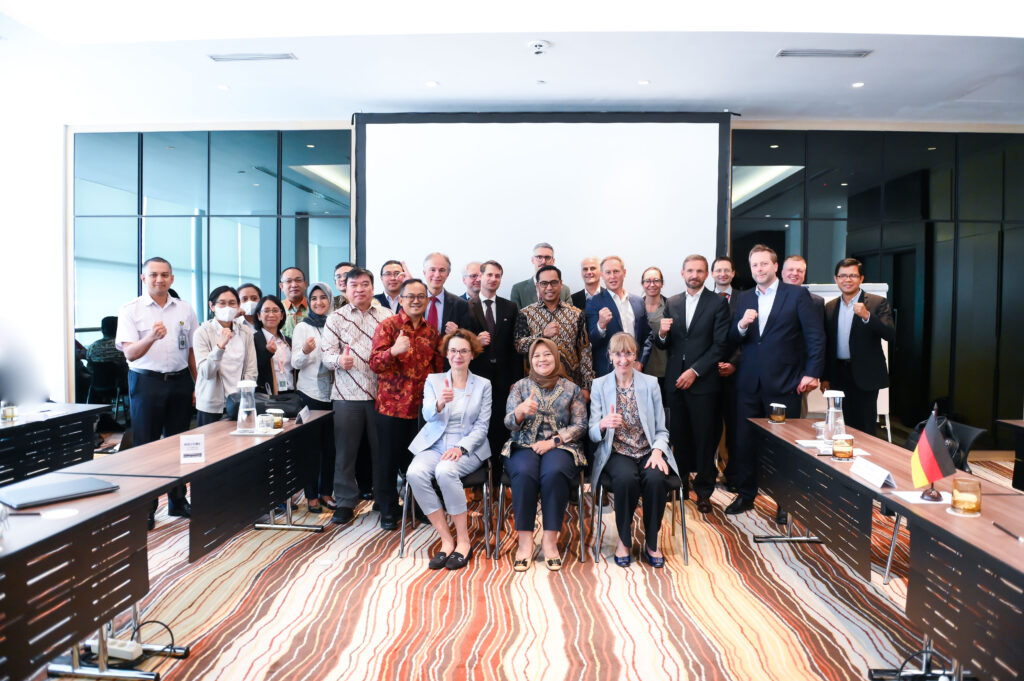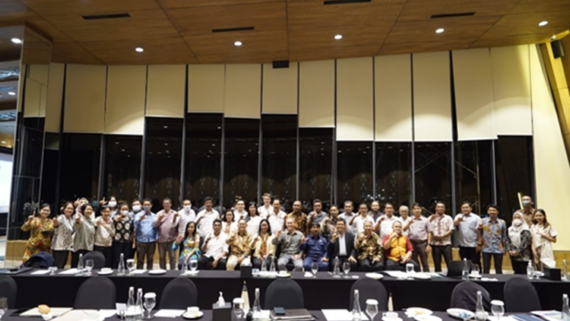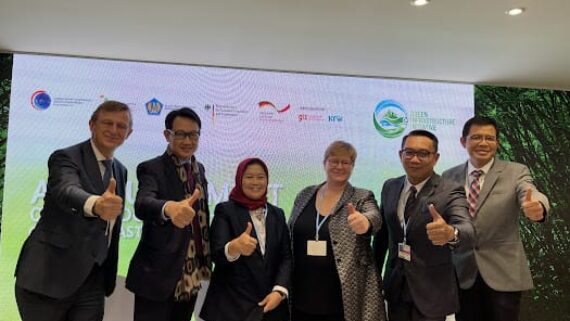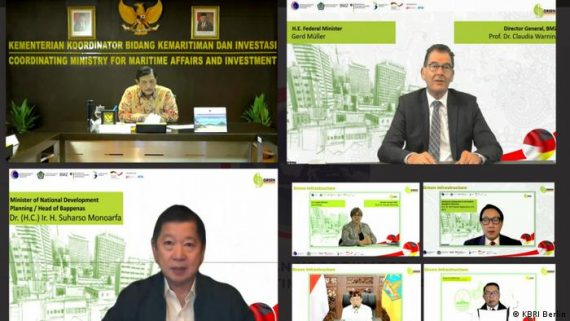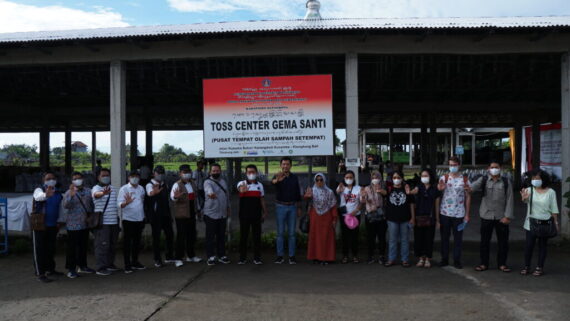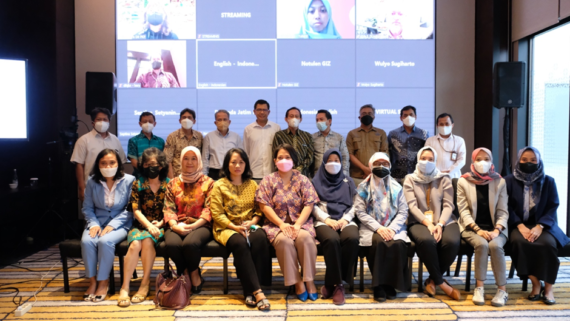Indonesia – Germany Bilateral Meeting: Mapping the Best Strategy for Sustainable Development Cooperation
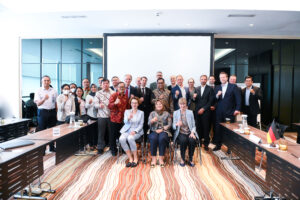
Kemenko Marves hosted a “High Level Policy Dialogue” on February 13th 2023 in Jakarta
The Coordinating Ministry for Maritime Affairs and Investment (Kemenko Marves) hosted a “High Level Policy Dialogue” to discuss cooperation policy agreements in the priority sectors between the two countries as well as their flagship project the Green Infrastructure Initiative (GII) on 13 February 2023 in Jakarta.
In each session, the bilateral cooperation meeting was divided into three parts in which discussions focused on policies, future plans for Indonesia-Germany development cooperation and the current challenges faced by the GII project as well as way forward.
For the mobility and circular economy dialogue session, the Indonesian delegation was led by Bapak Rachmat Kaimuddin, Deputy for Infrastructure and Transportation Coordination, Kemenko Marves, while the German delegation was led by Ibu Christine Toetzke, Director General of BMZ for Asia.
In the mobility session, the discussion was focused on the urban mobility projects under German-supported institutions that can be linked with Indonesian national priorities as well as mechanisms for institutional arrangements and capacity building to facilitate the implementation and sustainability of mobility projects after being handed over from the central government to local governments.
The economic circular session discussed coordination between ministries and local governments, especially in relation to waste management, and how waste-producing parties and the private sector can make a more real contribution in community-to-urban scale waste and waste management programs. Participants of this session concluded that there should be future mechanism that allows more significant involvement of non-government parties in the planning and implementation stages.
In the waste management session, Ibu Astriana Harjanti, Head of the Sub-Directorate for Management of Foreign Loans and Grants, Ministry of Public Works and Public Housing (MPWH) said that efficient use of foreign funds can help the Government of Indonesia achieve the development targets especially those related to reducing emissions through more integrated and modern waste management. Discussion participants agreed that since the planning stage of a bilateral project, it would be best to map the type of project funding, either through a grant or loan scheme, so that the cooperation can run effectively.
Bapak Rofi Alhanif, Assistant Deputy for Waste Management at the Deputy for Coordination of Environment and Forestry Management of Kemenko Marves presented holistic waste management methods. According to him, waste handling does not only rely on the Final Disposal Site (TPA), rather the need to increase public awareness and participation to manage waste at its source. Representatives from several relevant ministries also discussed the status of 3R (reduce, reuse, recycle) waste management projects in a number of regions in Indonesia.
Ibu Sabine Schmitt, Head of Development Cooperation, German Embassy in Jakarta said that she hoped this sectoral dialogue would be followed with a comprehensive approach from the two countries, so that all relevant parties could elaborate the best design for Indonesian-German cooperation projects.
The last session of the high sector dialogue was on developments, progress and challenges in the implementation of GII which was led by the Deputy for Environment and Forestry Management Coordination Ibu Nani Hendiarti and Ibu Christine Toetzke. In her opening remarks, Ibu Nani said that GII is an ambitious project that requires intensive coordination from all related parties. Thus, this bilateral meeting is important because all parties can have deeper discussions regarding the constraints and challenges of implementing the GII project, including the status of the 18 project proposals that have been approved in the previous Steering Committee session.
The German Ambassador in Jakarta, Ibu Ina Lepel is excited that the GII’s three main sectors of water and wastewater, solid waste management and urban public transportation have become Indonesia’s development priorities, as such, the GII program is increasingly aligned with Indonesia’s National Mid-Term Development Plan (RPJMN).
The Chair’s Meeting session discussed the development of the project proposal (dossier) which had been agreed upon for the pre-feasibility study, as well as its current status.
The visit of Ibu Christine Toetzke to Indonesia was ended with a closing meeting which was held on Wednesday, 15 February led by Bapak Scenaider Clasein Siahaan, Director of Development Funding Bappenas, and Bapak Kurniawan Ariadi, Director of Bilateral Funding Bappenas, and Ibu Nani Hendiarti and Bapak M. Saleh Nugrahadi from Kemenko Marves.
At this meeting, Ibu Christine said that the priority sectors for development between Indonesia and Germany are very much aligned, especially in the field of energy transition. According to Ibu Christine, the bilateral cooperation between the two countries has a wide geographic scope, and it would be very good if the focus on areas of cooperation could be sharpened, for example targeting on less developed areas so that the benefits of programs and financial assistance are increasingly beneficial to the people of Indonesia.
Bapak Scenaider also appreciated the on-going bilateral cooperation between Indonesia and Germany, especially in the energy sector as it poised to support Indonesia’s Green Economy program. In the future, this collaboration is expected to be expanded into other sectors, such as mangroves and peatlands, which may play a pivotal role in mitigating the impact of climate change.
The meeting also emphasized Indonesia’s and Germany’s commitment to ensure that a number of infrastructure projects supported by GII can be processed into the Blue Book (list of medium-term foreign loan plans) this year.
Through the visit of Ibu Christine and the German delegation to Indonesia, it is hoped that the Indonesia-Germany bilateral cooperation program will get stronger and realize the commitment of the two countries to improve the welfare of the Indonesian people in a sustainable manner.
 English
English Indonesia
Indonesia
